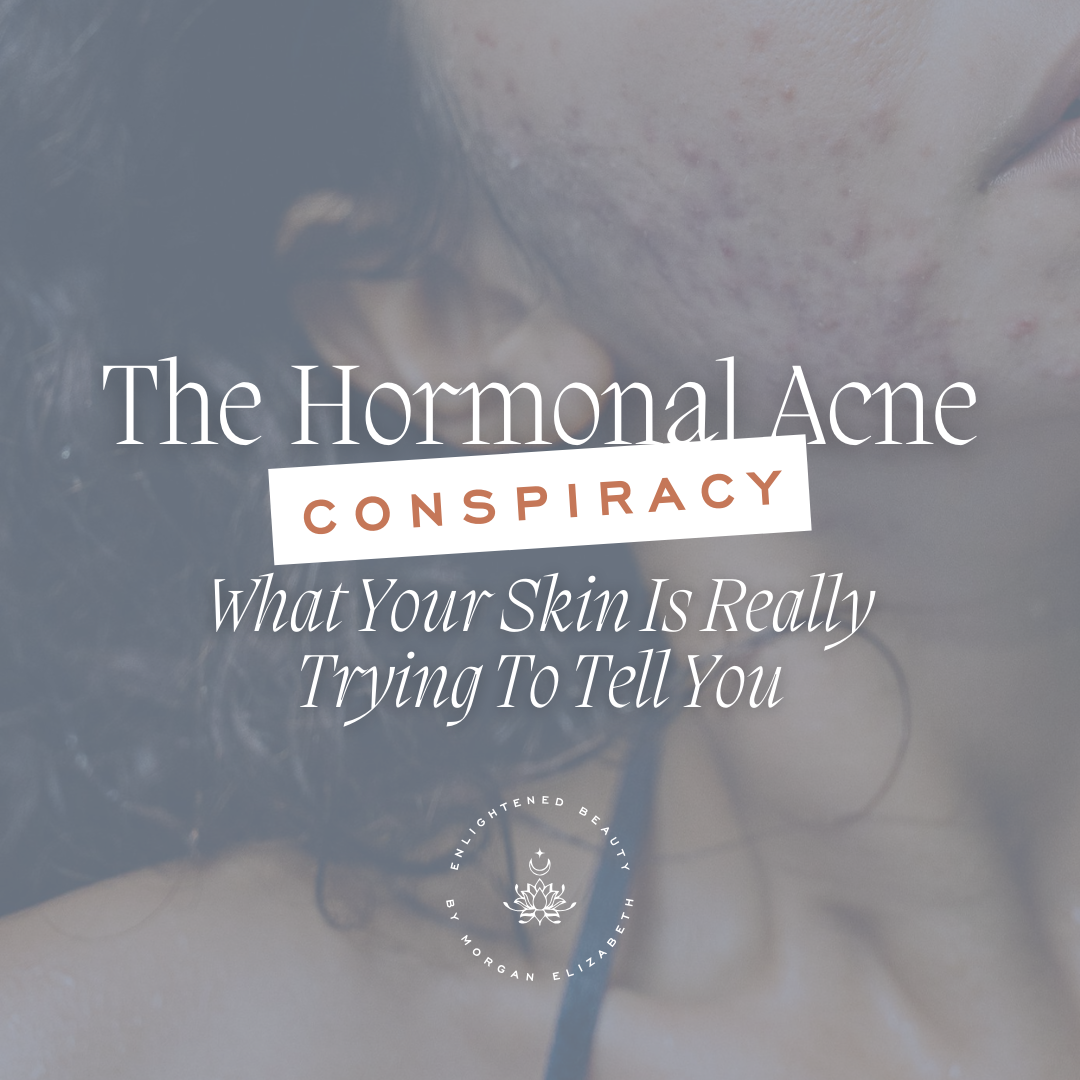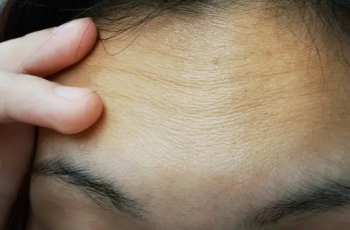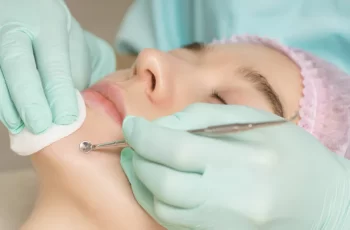
Acne, we talk about it often here at Enlightened Beauty and if anything is certain — it’s that it’s not just a one-size-fits-all issue. Among the various types, hormonal acne has an air of mystery to it and stands out most for its stubborn nature and deep connection to our body’s internal rhythms.
So, what makes hormonal acne so distinct, and why is it essential to differentiate it from other acne forms? That’s exactly what we’re going to explore in this article.
Understanding hormonal acne is the first step towards managing it effectively. It’s about recognizing the signs, knowing when to seek holistic approaches, and understanding that this condition is more than skin deep.
Whether you’re a long-time sufferer or just starting to notice changes in your skin, this guide is for you.
What Exactly is Hormonal Acne?
Hormonal acne, as the name suggests, is acne that’s closely tied to fluctuations in your hormones. It’s different from other types of acne because it’s directly linked to the internal changes your body goes through, which can be influenced by many factors, such as your menstrual cycle, pregnancy, menopause, or even stress levels.
How Can You Tell It’s Hormonal Acne?
Unlike the occasional breakout that anyone might experience, hormonal acne tends to appear in specific areas, such as the jawline, chin, and sometimes the cheeks, and it often comes in the form of cysts or nodules, which are deeper, more painful, and more likely to leave scars.
So, why does hormonal acne primarily affect these areas and in such a stubborn manner? We can thank the androgens, a group of hormones that includes testosterone. Androgens can cause the oil glands in your skin to overproduce sebum, leading to clogged pores and, eventually, acne.
Hormonal acne might not come alone. It can be accompanied by other signs of hormonal imbalance like irregular periods, sudden weight changes, hair loss or excessive hair growth, and mood swings.
Do Men Get Hormonal Acne?
Absolutely. While it’s more commonly discussed in the context of women’s health due to the visible cyclical nature of their hormonal changes, men can also experience hormonal acne. For men, it’s usually tied to fluctuations in testosterone levels, which can affect oil production in the skin.
What Triggers Hormonal Acne?
While hormones often get the blame for breakouts, I always remind my clients that their hormones are really just part of a larger, interconnected system. If you find yourself battling breakouts before or during your period, it’s not just “hormones acting up” in isolation. During this time, your body prioritizes processes like shedding the uterine lining, which can temporarily suppress your immune system.
This suppression might lead to cravings for sweet, salty, or high-carb foods, which becomes a domino effect — further inflaming your body and complicating its quest for balance.
What’s Really Behind Hormonal Fluctuations?
Asking “What is driving my hormones to do what they’re doing?” opens up a broader conversation about the role of lifestyle in hormonal balance. With allergies and immune issues aside, on a more general level, you’ll often find that leading a balanced life plays a major role in how significantly your hormones may fluctuate.
BETTER QUESTIONS TO PONDER DURING A HORMONAL BREAKOUT
When faced with a hormonal breakout, it’s easy to feel frustrated and look for quick fixes. However, taking a moment to reflect on underlying causes can be enlightening and lead to more effective long-term solutions. Here are some thoughtful questions to consider that might help you identify patterns and triggers related to your hormonal acne:
What cravings have I been succumbing to? Reflect on whether your diet has changed recently, especially an increase in sugar, dairy, or processed foods, which can influence acne.
Has anything brought more stress into my life than usual lately? Stress can significantly impact hormonal balance and skin health. Identifying new or increased stressors can help you find ways to mitigate their effects.
Is there a pattern with my breakouts and my period? Tracking your menstrual cycle alongside your acne flare-ups can reveal correlations between hormonal changes and skin health. Read our post on Cycle Syncing for more inspiration on this >>
Am I getting enough sleep? Lack of sleep can disrupt hormonal balance and exacerbate skin issues, including acne.
How am I managing my stress? Consider if you’re effectively managing stress or if there’s more you could do to relax and unwind.
Am I staying hydrated and eating a balanced diet? Hydration and nutrition play crucial roles in skin health. Reflect on your water intake and diet to ensure they’re supporting your skin.
By asking yourself these questions, you can begin to uncover the lifestyle factors that may be contributing to your hormonal acne.
Can Hormonal Acne Be Treated Holisticially?
In most cases, yes! As a licensed esthetician and integrative nutrition coach, I stand behind the fact that fully addressing hormonal acne isn’t just about what you put on your skin — it’s about how you care for your body as a whole.
A holistic approach to skincare considers your diet, stress levels, sleep quality, and overall lifestyle. When considering your hormonal acne treatment, take a look at these key factors that significantly impact skin health:
Dietary Adjustments:
What you eat can influence your hormone levels and, in turn, your skin. Incorporating foods rich in omega-3 fatty acids, antioxidants, and fiber can help balance hormones and reduce inflammation. Limiting sugar, dairy, and processed foods may also decrease acne flare-ups.
Stress Management & Support Systems:
High stress can increase cortisol levels, further exacerbating hormonal imbalance and acne. Having a strong support system in your life can truly help you mitigate stress. Practices like yoga, meditation, and regular exercise can also help manage stress and promote a healthier skin complexion.
Quality Sleep:
Adequate rest is crucial for hormone regulation. Establishing a regular sleep schedule supports your body’s natural rhythms and can support hormone balance and skin repair.
Staying Hydrated:
Drinking plenty of water helps flush toxins from your body and maintain skin hydration, which helps aid the prevention of acne.
Consulting a Holistic Esthetician:
A holistic esthetician, like the ones you find right here at Enlightened Beauty, can provide personalized skincare advice, considering your entire lifestyle and its impact on your skin. When discussing hormonal acne with our clients, we often recommend customized lifestyle adjustments in addition to any treatments or products that will support your skin goals.
Pro-Tip: Remember, patience and consistency are key; it may take time to see significant changes, but a holistic approach offers the most sustainable path to healthier skin.
Final Thoughts On Treating Hormonal Acne
Remember, while we may ponder how to get rid of hormonal acne first, the real question to start with is, “What is driving my hormones to behave this way?”
Beyond the immediate effects of hormonal fluctuations, there’s a broader lifestyle picture to consider. Hormonal balance is significantly influenced by how we live our daily lives — from the stress we manage (or don’t manage) to the foods we consume and the amount of physical activity we engage in.
Living a balanced life — enjoying your career, having a strong support system, eating right, managing stress, and staying active — can create a stable environment where hormones are less likely to go haywire. This balance is a must not just for your overall well-being but also for maintaining clear, healthy skin.
At Enlightened Beauty, we’re committed to guiding you through this journey, offering support and personalized advice to help you achieve not just clearer skin, but a healthier, happier life. Remember, the path to overcoming hormonal acne is as much about nurturing your body from the inside out as it is about treating your skin from the outside in.


